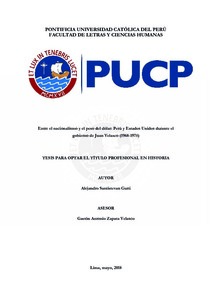| dc.contributor.advisor | Zapata Velasco, Gastón Antonio | es_ES |
| dc.contributor.author | Santistevan Gutti, Alejandro | es_ES |
| dc.date.accessioned | 2018-06-07T14:48:03Z | es_ES |
| dc.date.available | 2018-06-07T14:48:03Z | es_ES |
| dc.date.created | 2018 | es_ES |
| dc.date.issued | 2018-06-07 | es_ES |
| dc.identifier.uri | http://hdl.handle.net/20.500.12404/12131 | |
| dc.description.abstract | La política exterior del gobierno militar peruano (1968-1975) fue un “dolor de cabeza” para
el gobierno de los Estados Unidos en un contexto global de debilitamiento de su
hegemonía. Las acciones para devolver la dignidad nacional, como la expropiación de la IPC
o la defensa de las 200 millas, fueron osadas pero calculadas, ya que no implicaron una
subversión radical de la tradicional relación “amistosa” entre ambos países. Los militares
entendían que el capital y los préstamos de EE.UU eran indispensables para el desarrollo.
Por lo tanto, su política exterior estuvo orientada a superar el bloqueo financiero, impuesto
por EE.UU en protesta por la expropiación y no-compensación de la IPC, sin perder las
credenciales nacionalistas e independientes del gobierno. Las decisiones que tomaron los
militares estuvieron condicionadas por el compromiso nacionalista, el equilibrio de poder
dentro del régimen y, principalmente, por la necesidad de promover inversión y préstamos
extranjeros. | es_ES |
| dc.description.abstract | The Peruvian military government (1968-1975) came out as a “headache” for the United
States government in a global context framed by the weakening of its hegemony. The
expropiation of the International Petroleum Company or the defense of the thesis of the
200-mile territorial waters were oriented to recover national dignity and not to subvert the
traditional “friendly” relations between the two countries. As a matter of fact, Peruvian
military were convinced that dependence on capital and loans from the US was inescapable
in the short term. In that sense, Peruvian foreign policy was oriented to overcome the
financial blockade impossed by the US in order to sanction the non-compensation of the
IPC by the Peruvian government, without losing their nationalist and independent
credentials. In sum, the decisions that Peruvian policy-makers made were conditioned by
the nationalist commitment, the power equilibrium inside the regime and, mainly, the need
to promote private investment and foreign loans. | es_ES |
| dc.language.iso | spa | es_ES |
| dc.publisher | Pontificia Universidad Católica del Perú | es_ES |
| dc.rights | Atribución-NoComercial-SinDerivadas 2.5 Perú | * |
| dc.rights | info:eu-repo/semantics/openAccess | es_ES |
| dc.rights.uri | http://creativecommons.org/licenses/by-nc-nd/2.5/pe/ | * |
| dc.subject | Perú--Historia--1968-1975 | es_ES |
| dc.subject | Perú--Relaciones exteriores--Estados Unidos | es_ES |
| dc.subject | Estados Unidos--Relaciones exteriores--Perú | es_ES |
| dc.subject | Perú--Política y gobierno--1968-1975 | es_ES |
| dc.subject | Perú--Gobierno de las Fuerzas Armadas--1968-1975 | es_ES |
| dc.title | Entre el nacionalismo y el peso del dólar : Perú y Estados Unidos durante el gobierno de Juan Velasco (1968-1975) | es_ES |
| dc.type | info:eu-repo/semantics/bachelorThesis | es_ES |
| thesis.degree.name | Licenciado en Historia | es_ES |
| thesis.degree.level | Título Profesional | es_ES |
| thesis.degree.grantor | Pontificia Universidad Católica del Perú. Facultad de Letras y Ciencias Humanas | es_ES |
| thesis.degree.discipline | Historia | es_ES |
| renati.discipline | 222066 | es_ES |
| renati.level | https://purl.org/pe-repo/renati/level#tituloProfesional | es_ES |
| renati.type | http://purl.org/pe-repo/renati/type#tesis | es_ES |
| dc.publisher.country | PE | es_ES |
| dc.subject.ocde | https://purl.org/pe-repo/ocde/ford#6.01.01 | es_ES |






